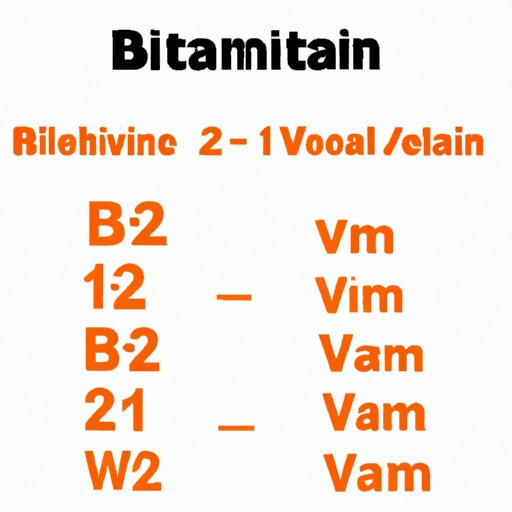
Introduction
Vitamin B12 is an essential nutrient that plays a crucial role in maintaining good health. It is a water-soluble vitamin that is responsible for numerous functions within the body. In this article, we will explore the benefits of vitamin B12, discussing its importance, functions, and sources.
Exploring the Benefits of Vitamin B12: What It Does for Your Body
Vitamin B12, also known as cobalamin, is a vitamin that is essential to the formation of healthy red blood cells. It is also important for the maintenance of the nervous system, as well as the metabolism of protein and fat in the body.
It is worth noting that vitamin B12 cannot be produced by the body and must be consumed through food or supplements. The stomach lining produces a protein called intrinsic factor that binds to the vitamin in the stomach and allows it to be absorbed in the small intestine.
How is Vitamin B12 Absorbed and Stored in the Body?
The liver stores vitamin B12, and it can be released as needed by the body. It’s worth noting that vitamin B12 can be stored in the body for several years, which means it’s possible to go without consuming it for a while without becoming deficient.
Common Sources of Vitamin B12
Vitamin B12 is found primarily in animal products like meat, poultry, eggs, and dairy. Vegans, vegetarians, and people who don’t eat animal products may need to get their vitamin B12 from supplements.
Unlocking the Secrets of Vitamin B12: How It Helps Keep You Healthy
Vitamin B12 and Energy Levels
Vitamin B12 is essential for maintaining energy levels and reducing fatigue. It allows the body to convert carbohydrates into glucose, which is used as a source of energy.
Vitamin B12 and Neurological Function
Vitamin B12 plays an important role in the production and maintenance of myelin, a fatty substance that surrounds and insulates nerves. A deficiency of Vitamin B12 can lead to neurological problems like numbness, tingling, and difficulty with coordination.
Vitamin B12 and Red Blood Cell Production
Vitamin B12 is essential for the production of healthy red blood cells. Without enough vitamin B12, red blood cells can become deformed and unable to function properly.
The Importance of Vitamin B12 for a Healthy Immune System
Vitamin B12 is necessary for a healthy immune system. It plays a role in the production of white blood cells that help the body fight off infections.
Why You Need Vitamin B12: Functions and Benefits for Your Body
Vitamin B12 and DNA Synthesis
Vitamin B12 aids in the production of DNA, which is essential for the growth and repair of cells. It also plays a role in the production of RNA, which is responsible for the synthesis of new proteins.
Vitamin B12 and Bone Health
Vitamin B12 helps in the production of osteoblasts, which are the cells responsible for bone formation. It also works with other nutrients like calcium and vitamin D to maintain strong and healthy bones.
Vitamin B12 and Cardiovascular Health
Vitamin B12 helps to reduce levels of homocysteine, an amino acid that can damage blood vessels and increase the risk of heart disease. It also helps to lower cholesterol levels and thereby reduces the risk of heart-related conditions.
Vitamin B12 and Skin and Hair Health
Vitamin B12 helps to keep the skin and hair healthy by improving the production of oil glands and hair follicles, making the hair more vibrant and lustrous.
The Vital Role of Vitamin B12: A Comprehensive Guide to Its Benefits
All the functions and benefits of vitamin B12 that we have discussed in the previous sections contribute to keeping the body healthy and functioning properly. A deficiency of vitamin B12 can lead to various health issues, ranging from anemia to neurological problems.
Risks Associated with Vitamin B12 Deficiency
Vegetarians and vegans are at a higher risk of vitamin B12 deficiency because the vitamin is primarily found in animal products. Other groups at risk of vitamin B12 deficiency include people with gastrointestinal disorders that interfere with vitamin absorption, people with pernicious anemia, and people who have had gastrointestinal surgery.
Boosting Your Health with Vitamin B12: How It Supports Your Body’s Systems
Increasing Intake of Vitamin B12
Consuming animal products like meat, poultry, eggs, and dairy is the easiest way to get enough vitamin B12. Fortified cereals, nutritional yeast, and some plant-based milk are also sources of vitamin B12. People who don’t consume animal products should consider taking supplements to make sure they’re getting enough vitamin B12.
Potential Benefits of Vitamin B12 Supplements
Taking vitamin B12 supplements is generally safe and can help you meet your daily requirements. Supplements are available in various forms, including tablets, capsules, and injections, and are generally inexpensive.
Managing a Vitamin B12 Deficiency
If you have a vitamin B12 deficiency, your doctor may recommend injections to stimulate the body’s absorption of the nutrient. Alternatively, you may be asked to increase your intake of vitamin B12-rich foods.
A Closer Look at Vitamin B12: What It Does and Why You Can’t Do Without It
Vitamin B12 plays a crucial role in maintaining good health. It contributes to the proper functioning of various systems in the body, including the nervous system, the immune system, and the cardiovascular system. In summary, vitamin B12 is essential for energy production, healthy red blood cell production, proper neurological function, immune function, DNA synthesis, bone, skin and hair health, and reducing the risk of heart disease.
Conclusion
We hope this article has been informative, and you now have a better understanding of the importance of vitamin B12 for good health. Make sure to include enough vitamin B12 in your diet and consider taking supplements if needed or as advised by your doctor. By prioritizing the intake of vitamin B12, you will support your body’s systems, stay healthy, and reduce the risk of diseases.




